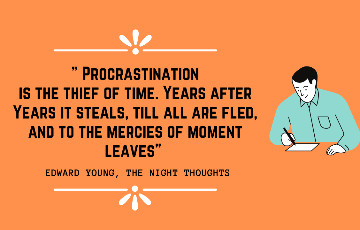
Learn about procrastination and its detrimental effects on time and productivity. Discover strategies to overcome procrastination and enhance efficiency.
We all know how Procrastination overshadows all the good habits we have. But here’s a poet, taken a step above and explained how procrastination is robbing your time. Edward Young, an English poet, has written about procrastination in his poem “The Night Thoughts”. He describes how procrastination steals your time and slowly takes away everything productive from you.
The lines in his poems say:
“Procrastination is the Thief of Time. Year after year it steals, till all are fled, and to the mercies of a moment leaves.” – Edward Young, Night Thoughts.
Procrastination is the Thief of Time: Explained
The Poet has rightly pointed out that procrastination steals away your valuable time. Slowly, procrastination can become a habit. And year after year if we look back, procrastination would have taken all productive things away from us. Except for the mercies of the present moment, all progressive things would have been lost by then.
With Procrastination:
What’s Lost is Lost!
We all have heard a line that says “what’s lost is lost”. It is true with procrastination. The time, efforts, progress, good-habits, good-routines, and all good things in our life can go in vain if we keep procrastinating. We cannot get back the time lost. Edward young rightly pointed out that “year after year, it steals”.
It steals your Years!
Imagine that if you keep procrastinating your tasks every day. By the end of the month, you will have a heap of unfinished tasks. Imagine if you keep doing this habit for three months or six months? What happens? You have lost a valuable period of the year.
Conclusion:
Edward young is clear that procrastination is the thief of time, as it takes away all the good things we have year after year till we are left with nothing but the present!


